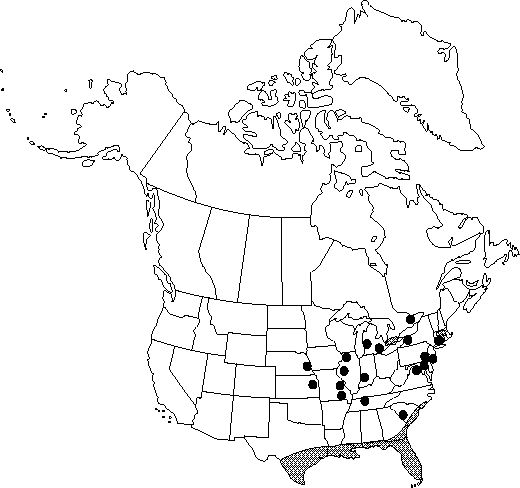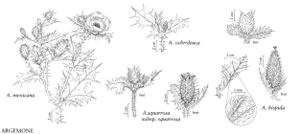Argemone mexicana
Sp. Pl. 1: 508. 1753.
Plants annual. Stems often branching from base, 2.5-8 dm, unarmed or sparingly prickly. Leaf blades: surfaces unarmed or sparingly prickly on veins; proximal lobed 1/2 or more distance to midrib; distal more shallowly lobed, mostly clasping. Inflorescences: buds subglobose, body 10-15 × 9-13 mm, unarmed or sparingly prickly; sepal horns terete, 5-10 mm, unarmed. Flowers 4-7 cm broad, subtended by 1-2 foliaceous bracts; petals bright yellow or rarely pale lemon yellow; stamens 30-50; filaments yellow; pistil 4-6-carpellate. Capsules oblong to broadly ellipsoid, 25-45 × 12-20 mm (including stigma and excluding prickles when present), unarmed or prickly, longest prickles 6-10 mm. Seeds 1.6-2 mm. 2n = 28.
Phenology: Flowering and fruiting spring–fall, or throughout year in tropics.
Habitat: Waste places, often a weed of roadsides, dooryards, fallow fields
Elevation: 0-1500 m
Distribution

Ont., Ala., Conn., Fla., Ga., Ill., Ind., Kans., La., Md., Mass., Mich., Mo., Nebr., N.J., N.Y., N.C., Pa., S.C., Tenn., Tex., Va., Mexico, West Indies, Central America.
Discussion
Argemone mexicana is probably native to southern Florida as well as the Caribbean islands and has been introduced along the coast of the United States from New England to Texas and, more infrequently, inland. Although it has been reported from Mississippi, no specimens are known. It is widespread in temperate and tropical regions around the world by introduction.
Selected References
None.
